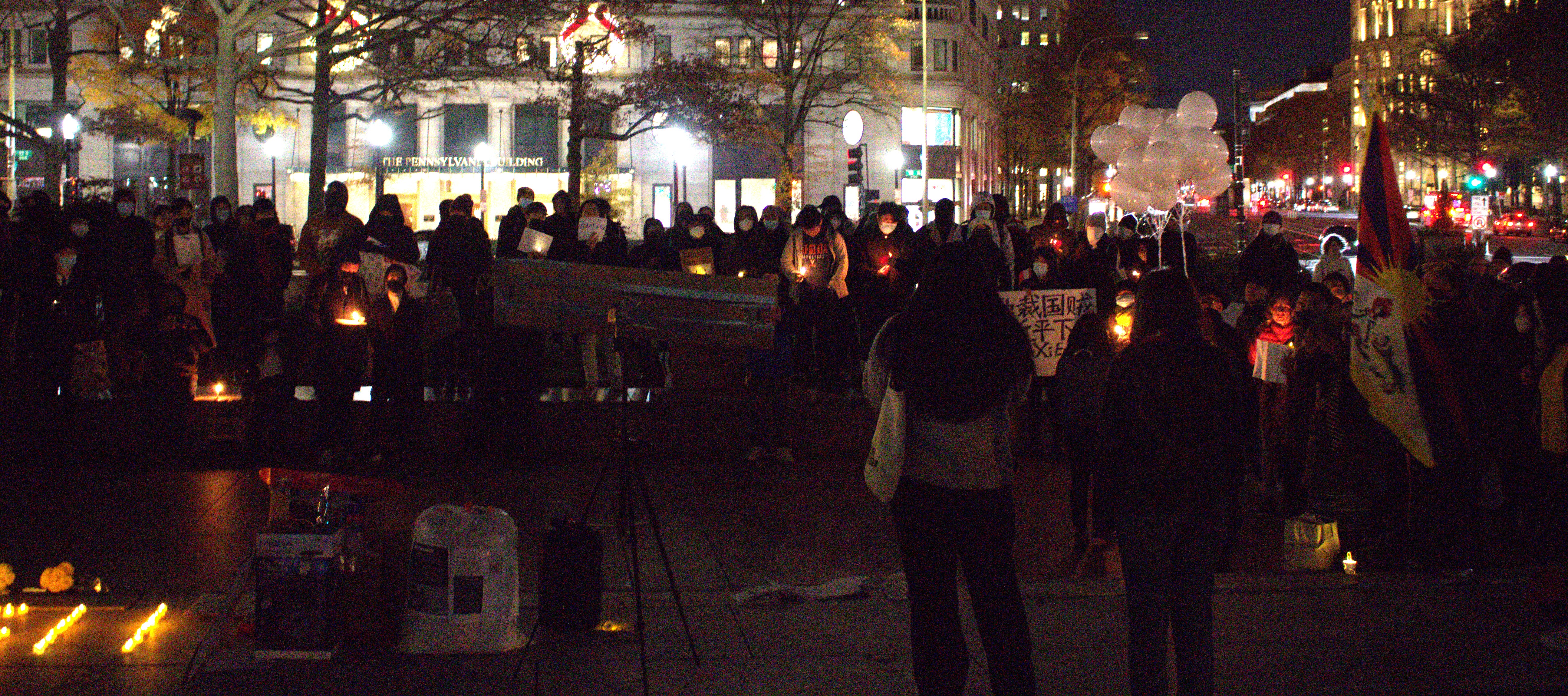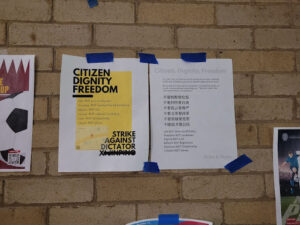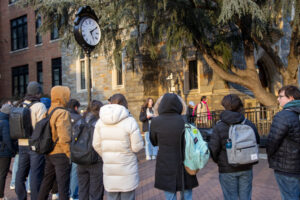A vigil was held in Freedom Plaza on Dec. 4 to honor and mourn the victims of the Urumqi fire in the Xinjiang region of China. Attendees also called for an end to the Chinese Communist Party (CCP)’s political domination, which—among numerous examples—has manifested in President Xi Jinping’s precedent-breaking third term, its strict zero-COVID policy, an ongoing genocide against the Uyghur people, and its occupation of Tibet.
“It is a privilege to speak freely,” Ryan, a speaker at the vigil who declined to share their last name, said. “[Protesting] is not only for myself, but for every innocent victim in China.”
The vigil follows weeks of protest against China’s zero-COVID policy, which has placed strict restrictions on mobility for the last three years to reduce the spread of COVID-19. The zero-COVID policy has made daily life substantially harder, leading to growing discontent throughout the country. Social media posts from across the country have shown food shortages and delays or refusals of medical care.
Protestors mobilized after the fire killed at least ten people, with thousands taking to the street in the largest public demonstrations in 30 years. The protestors are protesting what they see as the zero-COVID policy directly contributing to these deaths, since pandemic control barriers and measures prevented first responders from reaching the fire and building residents from evacuating effectively. Individuals, holding blank sheets of white paper in silent protest against China’s draconian censorship laws, have become an international symbol of resistance.
“It’s just like déjà vu,” Yuki Zhang (LAW ’23), an attendee of the vigil, said of the protests. “Since I was little, my father who went to Tiananmen Square in 1989 during the June Fourth protest told me all about this.”
The government’s response has been swift and brutal. Authorities have been searching phones, using facial recognition programs, and detaining protestors en masse.
“We’re here because we want to demand that the Chinese government stop these protection COVID lockdowns once and for all, and to release the people who have been arrested because of participating in peaceful protests in Shanghai,” Chen, a Georgetown student and vigil attendee who preferred to be identified only by their last name, said.
There were about 100 attendees at the vigil, many of whom held candles and wore face coverings to protect their identities. Protestors chanted and sang together, naming the victims and calling for the end of the CCP and as a matter of course Xi’s presidency: “Hey hey, ho ho, Xi Jinping has got to go.”
“I think the best course for us would be to demand that the CCP step down and be separated from power,” Chen said. “We should not let it succeed, and keep our unity until the day where we have our freedom, until a time where we can peacefully express our opinions and effect change in society without fear of being arrested.”
The protests included calls to end the Uyghur genocide in the Xinjiang region and the oppression of Tibetans under Chinese occupation. Since around 2014, the Chinese government has pursued a policy of repression and incarceration of Uyghurs. A United Nations report called these actions crimes against humanity, and the U.S. determined the actions constitute genocide. Similarly, political repression and surveillance has increased in Tibet under the guise of a new “anti-crime” campaign.
“We want to spread the fact that Tibetans are here to stay, that Uyghurs are here to stay, that Hong Kongers, Taiwanese, and all those oppressed under the Chinese rule are here to stay and have our voices heard,” Tsetan Namdol, a sophomore at American University who spoke at the vigil, said. “We’re not going to back down.”
“This is who we are,” she added. Namdol is a member of the Students for A Free Tibet chapter at American, an international grassroots organization that advocates for the liberation of Tibet from CCP occupation and promotes Tibetan culture.
“It is a modern-day cultural genocide,” Namdol said of Tibetan oppression under the CCP.
For American students wondering how they can make a difference, several attendees noted it is important to be informed and to write to government representatives and other elected officials to demand the U.S. call for an end to the ongoing genocide and political repression.
Other vigil attendees called for more concrete actions and awareness from Georgetown students and administrators. “We just want to make this known to a broader student body, as well as the school faculty, and professors,” Zhang said. “If the school is willing to make a statement in support of the protest and human rights in general, that would be great.”
Attendees remained optimistic about the potential for change despite the somber atmosphere. “In the future, it is going to be our country,” Chen said. “We are going to have to change it into a place where we can live peacefully.”






